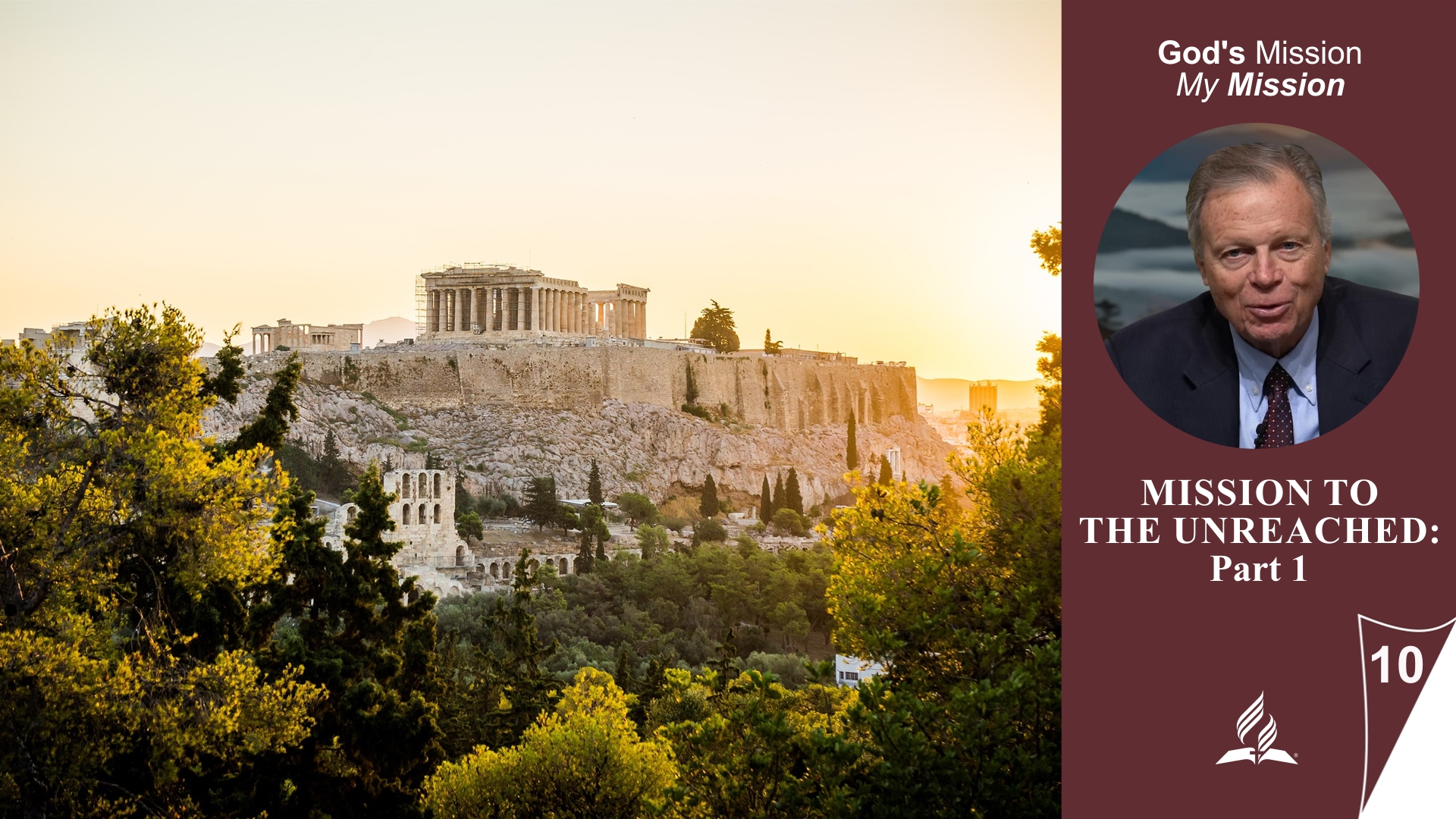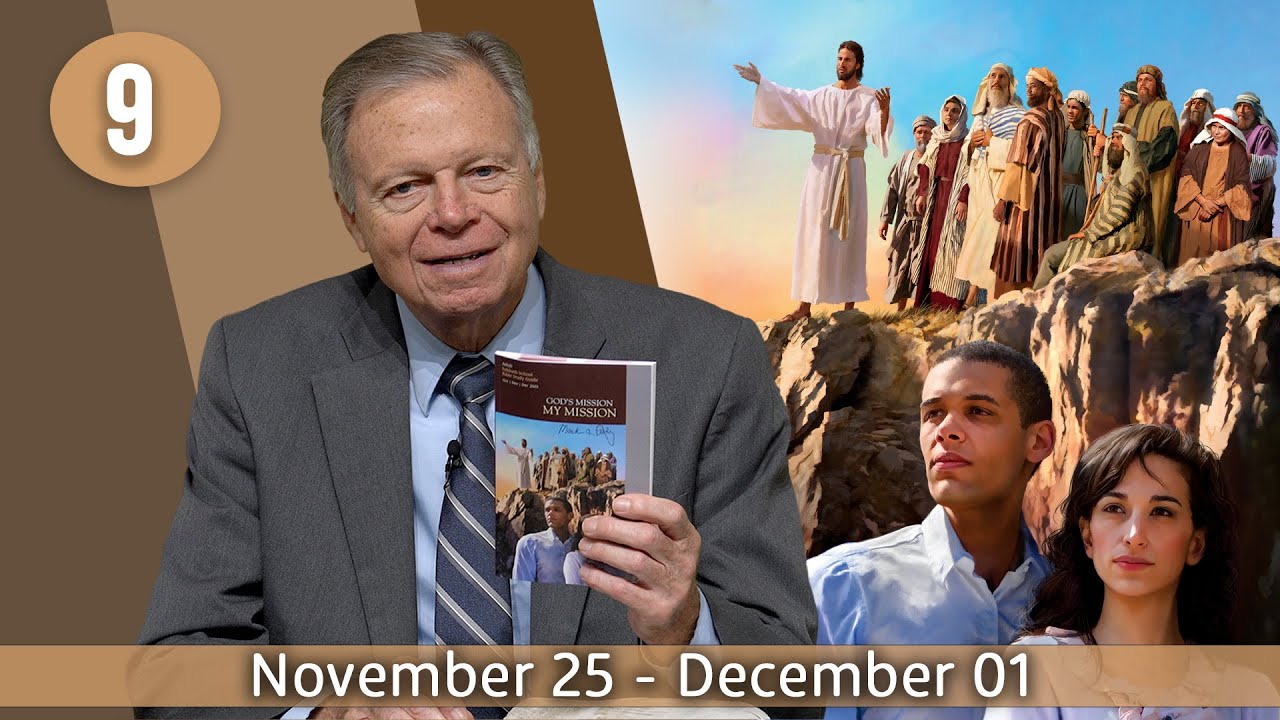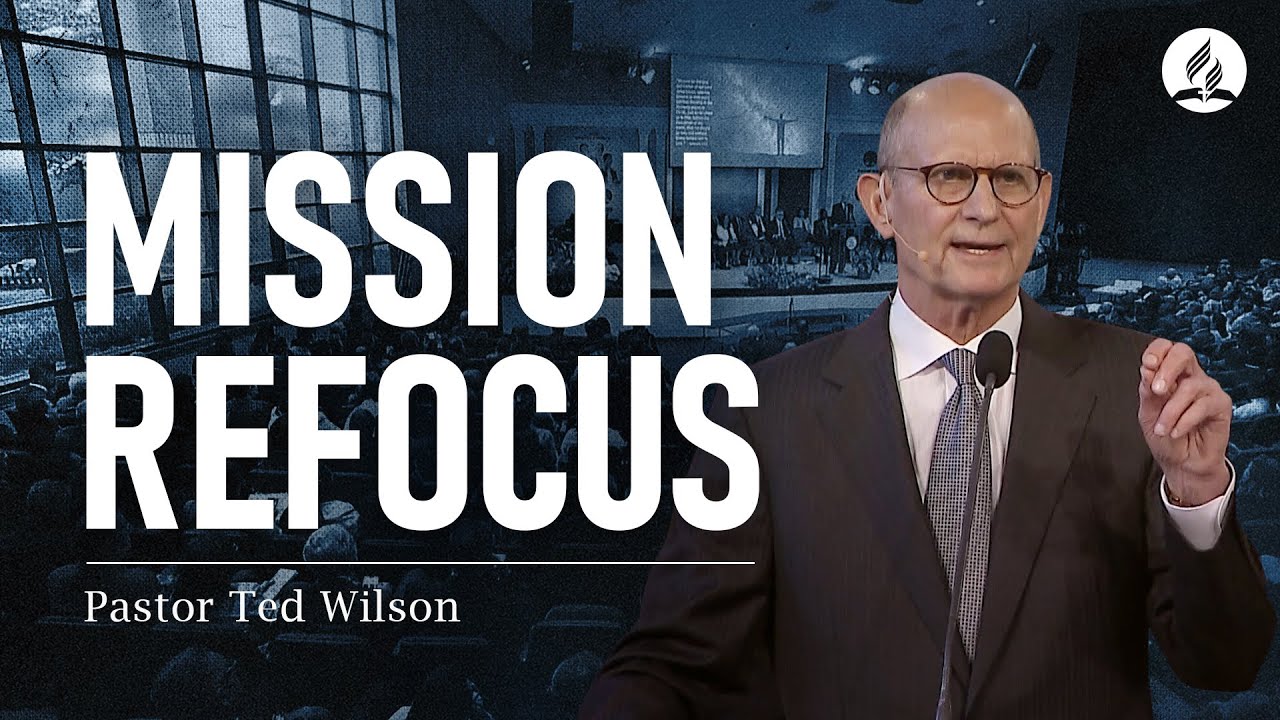
God’s Mission, My Mission – Lesson 9: Mission to the Mighty | Sabbath School with Pastor Mark Finley

Series GOD’S MISSION, MY MISSION with Pastor Mark Finley |
Lesson 9: Mission to the Mighty |
Memory Text: 1: Matthew 16:26 – For what profit is it to a man if he gains the whole world, and loses his own soul? Or what will a man give in exchange for his soul? |
Content:
9.1 Nebuchadnezzar
The emphasis on the “unlimited atonement” in Adventist doctrine underscores the universal redemption through Christ, irrespective of predetermined groups. The story of Nebuchadnezzar in Daniel 4 strikingly illustrates how even one of the most powerful men in the world was brought to reason through God’s intervention. This highlights that God’s mercy extends not only to the weak but also reaches the rich and powerful. Nebuchadnezzar’s humiliation due to pride and arrogance serves as a reminder that God chooses different paths to reach people, regardless of their power and status.
9.2 Naaman
The story of Naaman in 2 Kings 5 emphasizes the universality of Christ’s sacrifice for people of all backgrounds and statuses. Naaman’s extraordinary plea after his healing reveals his sincere devotion to the living God, even though pagan influences still lingered in his thinking. His willingness to faithfully serve the Lord despite challenges in a pagan land attests to Naaman’s genuine faith. Elisha’s response, “Go in peace,” emphasizes God’s gentle guidance for converts who are meant to grow step by step in faith.
9.3 Witnessing to the Learned: Nicodemus
The story of Nicodemus shows that external wealth and education do not necessarily fulfill a person’s spiritual needs. Despite his high position and knowledge, Nicodemus sought spiritual fulfillment and found it in Jesus. The encounter with Christ revealed that outward appearances can be deceptive and that everyone, regardless of social status, needs salvation. Nicodemus’s later actions, indicating a strong influence by Jesus, demonstrate the transformative power of the Gospel that can also reach seemingly powerful individuals.
9.4 Mission to the Rich
Jesus’s encounter with the rich young man in Matthew 19 emphasizes the challenge that wealth can pose to entering the kingdom of God. The statement that it is easier for a camel to go through the eye of a needle does not imply that the rich cannot be saved but highlights the potential obstacles that wealth can present. Both the rich and the poor face the same fate, death, and urgently need salvation through faith in Jesus Christ. The comparison between the rich young man and Zacchaeus in Luke 19 shows that the response to Jesus is crucial, and while the rich man clung to his possessions, Zacchaeus was willing to change his life and respond to Jesus’s call.
9.5 Mission to the Powerful
The text emphasizes Jesus’s ability to befriend the mighty, eliciting admiration and respect, but also disdain. Examples of Nicodemus and Joseph of Arimathea show that many rich and powerful individuals initially come to Jesus in secret to ensure he is truly the Son of God. The account of Joseph of Arimathea in Matthew 27 illustrates how God used a wealthy man influenced by Jesus for His purposes.
Mission among the mighty requires wisdom to know where to begin. It is often more effective to let the mighty come to you rather than actively seeking them out, as Jesus did. The subtle partnership with the mighty should be based on genuine service, as they want to be part of something good that transforms lives. The call to invest time in the lives of the rich and powerful and to pray for them demonstrates a practical approach to mission among this group.
Mission Refocus | Pastor Ted Wilson

Pastor Ted Wilson, president of the General Conference of Seventh-day Adventists, shares a special message this week about the importance of ‘Mission Refocus’ as a global organization and local churches, communities, and families. As Seventh-day Adventists, we are called to a special mission for God in these last days of Earth’s history. We are Chosen for Mission to proclaim the Three Angels’ Messages, a mission that will be accomplished through the Holy Spirit despite current and future attacks.
Mission Refocus is more than a Strategic Plan for the Adventist Church, it is a missional lifestyle for members, leaders, and communities.
Source: https://fulfilleddesire.net/mission-refocus-pastor-ted-wilson/
God’s Mission, My Mission – Lesson 8: Mission to the Needy | Sabbath School with Pastor Mark Finley

Series GOD’S MISSION, MY MISSION with Pastor Mark Finley |
Lesson 8: Mission to the Needy |
Memory Text: 1: Matthew 25:40 – And the King will answer and say to them, ‘Assuredly, I say to you, inasmuch as you did it to one of the least of these My brethren, you did it to Me’ . |
Content:
8.1 The Faith of Friends
The story of the friends who brought a needy person to Jesus shows us the importance of faith, commitment, and creativity in serving others. These men took responsibility for caring for their friend, and God calls us to do the same. We should not hesitate to bring those in need to Jesus, as He is the great physician ready to forgive and heal the suffering. Ellen White encourages us to actively address the needs of the helpless and be a part of the plan of salvation.
8.2 Christ’s Approach Alone
Christ’s approach to serving the needy presents us with a five-step process to serve others and gain their trust. First, we must put ourselves in their shoes to understand their needs. Compassion is the key without expecting anything in return. The third step involves practical actions to fulfill these needs. Through these steps, we build trust and, ultimately, lead people to Jesus to offer them eternal life. This method demonstrates true success in service.
8.3 Refugees and Immigrants
The topic of refugees and immigrants is of great importance in today’s world, with millions of people worldwide seeking refuge and assistance. The story of Jesus as a refugee in Egypt, as depicted in Matthew 2:13-14, serves as a reminder that even the Holy Family once fled danger and sought protection. It emphasizes the importance of supporting and advocating for immigrants and refugees, despite cultural and linguistic differences, as highlighted in Bible verses such as Deuteronomy 10:19, Psalm 146:9, Romans 12:13, and Leviticus 23:22. We should engage through prayer, information, and active assistance, even when it might pose political challenges.
8.4 Assisting the Injured
The world can often be hurtful, regardless of material wealth or poverty. Jesus’ mission to bring the gospel to those in need and heal broken hearts reminds us of our duty to pay attention to the needs of people around us and provide help. This should be done unconditionally, driven by selfless love and compassion, aiming to serve those in need rather than focusing solely on winning them for Jesus. Our service should be rooted in understanding and genuine assistance to support individuals in their diverse life situations.
8.5 Greater Love
The greatest love we can show is to lay down our lives for our friends, as mentioned in John 15:13. We should apply this principle in our service to others by actively approaching people and bringing them blessings, just as Jesus did. By striving to build friendships, whether with refugees, immigrants, or neighbors, we can both serve them and convey the message of God’s love. Our goal should be to be true friends to them and lead them to God as the ultimate helper.
God’s Mission, My Mission – Lesson 7: Mission to My Neighbor | Sabbath School with Pastor Mark Finley

Series GOD’S MISSION, MY MISSION with Pastor Mark Finley |
Lesson 7: Mission to My Neighbor |
Memory Text: 1: Luke 10:27 – He answered, ‘ “Love the Lord your God with all your heart and with all your soul and with all your strength and with all your mind”; and, “Love your neighbor as yourself.” |
Content:
7.1 The Question of Questions
The scribe posed to Jesus the central question of eternal life, even though he initially came to test Jesus. Nevertheless, Jesus recognized the significance of this question and used the opportunity to explore the hearts of the scribe and the audience. The question of eternal life is at the core of our existence and holds paramount importance, irrespective of religious rituals or practices. In 1 Corinthians 15:30-32, Paul emphasizes the importance of eternal life, pointing to the alternative, eternal death. Jesus always sought opportunities for mission, even when the motives of his conversation partners were doubtful.
7.2 Jesus’ Method and Response
The encounter between Jesus and the scribe illustrates that God knows the desires and yearnings of our hearts better than we do. In a similar vein, when others inquire about our faith, we should serve them to the best of our abilities, regardless of their motives, as their needs and desires may be genuine. The mentioned Bible verses, such as Matthew 26:56, Acts 17:11, 1 Corinthians 15:3, and 2 Timothy 3:16, teach us that the Word of God is the source of truth and that we should read and study it ourselves to find answers. God has given us His Word, where we can find all the necessary teachings for our lives and the attainment of eternal life.
7.3 To Inherit Eternal Life
The scribe answered his own question by stating that one should love the Lord, their God, with all their heart and treat their neighbor as themselves. Jesus affirmed this response and urged him to put it into practice to attain eternal life. This underscores that it is not enough to merely know the correct answers in faith; one must also put them into action. James 2:17-22 similarly emphasizes that faith without deeds is of little value and admonishes us to express our love for God and others through concrete actions, aiding the needy rather than offering lip service. Christianity is not solely a collection of beliefs but a way of life expressed through love and deeds.
7.4 Loving Others as We Love Ourselves
Jesus teaches us to love others as we love ourselves and stresses that our daily life is based on these two commandments. Galatians 5:14, Micah 6:6-8, and 1 John 4:20-21 reinforce this teaching by revealing that love for God is demonstrated through practical acts of kindness and interactions with other people. Paul explains that love for God becomes visible through the deeds that testify to our faith. This highlights the significance of love as a central principle in the Christian life, as Paul passionately underscores in 1 Corinthians 13.
7.5 The Good Samaritan Story Today
The parable of the Good Samaritan, told by Jesus, emphasizes that it is not sufficient to know the right answers; one must also put their beliefs into action. Jesus intended to show that our neighbor is not defined by origin, skin color, or social status but by anyone in need of our assistance. This story serves as a reminder to be attentive to the needs of people in our vicinity and actively help them, regardless of their faith or background. It encourages us to be kind and merciful, much like the Good Samaritan in the parable, and translate our faith into practical acts of neighborly love.
- « Previous Page
- 1
- 2
- 3
- 4
- 5
- 6
- …
- 246
- Next Page »
